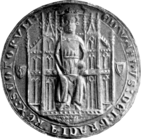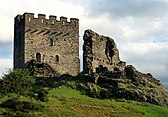From today's featured article
The Battle of Dupplin Moor, the first major battle of the Second War of Scottish Independence, was fought between supporters of King David II of Scotland and English-backed invaders supporting Edward Balliol (seal pictured) on 11 August 1332. Balliol and a largely English force of 1,500 landed in Fife and marched on Perth, the Scottish capital. The Scots, estimated to have been between 15,000 and 40,000 strong, raced to attack the English, disorganising their own formations. Unable to break the line of English men-at-arms, the Scots became trapped in a valley with fresh forces arriving from the rear pressing them forward and giving them no room to manoeuvre, or even to use their weapons. English longbowmen fired into both Scottish flanks. Many Scots died of suffocation or were trampled underfoot. Eventually the Scots broke and the English men-at-arms mounted and pursued the fugitives until nightfall. Perth fell, the remaining Scottish forces dispersed, and Balliol was crowned King of Scots. (Full article...)
Did you know ...
- ... that after Dolwyddelan Castle (pictured) was captured in January 1283, its new garrison was equipped with winter camouflage of white material and stockings?
- ... that former basketball player David Webber broke a record previously held by all-time great Larry Bird?
- ... that "In Bloom", the lead single of the EP Youth in the Shade, samples a-ha's 1984 single "Take On Me"?
- ... that Misuzu Yamada worked as a nursery teacher before starting her voice-acting career?
- ... that a Nebraska public radio station operated from a 1916-built Carnegie library in the 1970s and 1980s?
- ... that according to artist Tetsuya Nomura, Vanille's attire took inspiration from the Himba people of Namibia?
- ... that the Soviet Union boycotted the United Nations in 1950?
- ... that Nickelodeon storyboard artists created a book with hundreds of pornographic drawings of SpongeBob SquarePants characters?
In the news
- Wildfires in Hawaii kill at least 53 people and destroy much of Lahaina (damage pictured) on the island of Maui.
- Ecuadorian presidential candidate Fernando Villavicencio is assassinated in Quito, eleven days before the general election.
- The Hazara Express train derails in Sindh, Pakistan, killing 30 people.
- In cricket, the Ashes concludes with Australia retaining the trophy, drawing the series against England.
On this day
August 11: Independence Day in Chad (1960)
- 1492 – The first papal conclave to be held in the Sistine Chapel elected Roderic Borja as Pope Alexander VI to succeed Innocent VIII.
- 1929 – The first Bud Billiken Parade and Picnic, the oldest and largest African-American parade in the United States, was held in Chicago.
- 1945 – Amid rumors of kidnappings of children by Jews in Kraków, a crowd of Poles took part in a pogrom, resulting in at least one death.
- 1973 – At a party in New York City, Jamaican musician DJ Kool Herc (pictured) began rapping during an extended break, laying the foundation for hip hop music.
- Guttorm of Norway (d. 1204)
- James B. Longacre (b. 1794)
- Enid Blyton (b. 1897)
- Ian McDiarmid (b. 1944)
From today's featured list
The first deputy premier of the Soviet Union was the deputy head of government of the Union of Soviet Socialist Republics. Despite the title, the office was not necessarily held by a single individual. A first deputy premier was responsible over a specific policy area. For example, Kirill Mazurov was responsible for industry, while Dmitry Polyansky was responsible for agriculture. In addition, an officeholder would be responsible for coordinating the activities of ministries, state committees, and other bodies subordinated to the government. Twenty-six individuals held the post of first deputy premier. The first officeholder was Valerian Kuybyshev, who was inaugurated in 1934. Lavrentiy Beria spent the shortest time in office, serving for 113 days. At more than seventeen years, Vyacheslav Molotov (pictured) spent the longest time in office, and held his position through most of Joseph Stalin's term as Premier of the Soviet Union, as well as through the chairmanships of Georgy Malenkov and Nikolai Bulganin. (Full list...)
Today's featured picture

|
A Kármán vortex street is a process in fluid dynamics in which a repeating pattern of swirling vortices, caused by vortex shedding, is responsible for the unsteady flow separation of a fluid around blunt bodies. It is named after the Hungarian-American engineer and fluid dynamicist Theodore von Kármán. This satellite image, taken by NASA's Landsat 7 in 1999, shows a Kármán vortex street caused by wind flowing around the Juan Fernández Islands off the Chilean coast in the South Pacific Ocean. The flow of atmospheric air over obstacles such as islands can cause visible vortex streets when a cloud layer is present at a certain altitude. It can reach a length of more than 400 kilometres (250 miles) from the obstacle in such cases, with a typical vortex diameter of 20 to 40 km (12 to 25 mi). Photograph credit: Robert Cahalan, NASA
Recently featured:
|
Other areas of Wikipedia
- Community portal – The central hub for editors, with resources, links, tasks, and announcements.
- Village pump – Forum for discussions about Wikipedia itself, including policies and technical issues.
- Site news – Sources of news about Wikipedia and the broader Wikimedia movement.
- Teahouse – Ask basic questions about using or editing Wikipedia.
- Help desk – Ask questions about using or editing Wikipedia.
- Reference desk – Ask research questions about encyclopedic topics.
- Content portals – A unique way to navigate the encyclopedia.
Wikipedia's sister projects
Wikipedia is written by volunteer editors and hosted by the Wikimedia Foundation, a non-profit organization that also hosts a range of other volunteer projects:
-
Commons
Free media repository -
MediaWiki
Wiki software development -
Meta-Wiki
Wikimedia project coordination -
Wikibooks
Free textbooks and manuals -
Wikidata
Free knowledge base -
Wikinews
Free-content news -
Wikiquote
Collection of quotations -
Wikisource
Free-content library -
Wikispecies
Directory of species -
Wikiversity
Free learning tools -
Wikivoyage
Free travel guide -
Wiktionary
Dictionary and thesaurus
Wikipedia languages
This Wikipedia is written in English. Many other Wikipedias are available; some of the largest are listed below.
-
1,000,000+ articles
-
250,000+ articles
-
50,000+ articles




